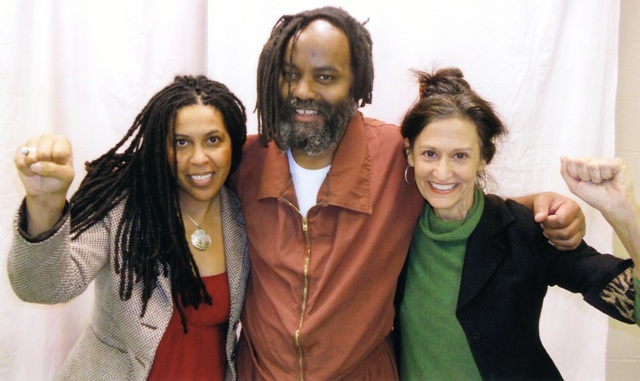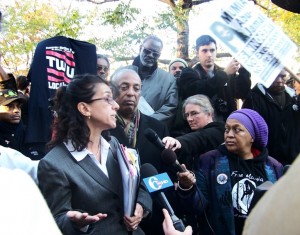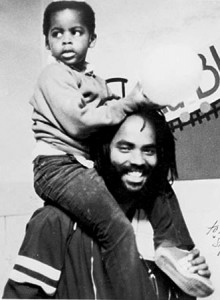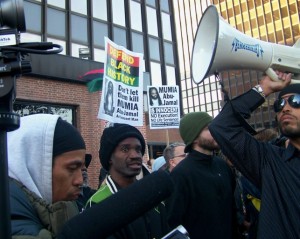
Filmmaker/professor Johanna Fernandez, Mumia Abu-Jamal and National Lawyers Guild President Heidi Boghosian during visit Feb. 2, 2012
From Johanna Fernandez
February 3, 2012
Comrades, Brothers and Sisters:
Heidi Boghosian and I just returned from a very moving visit with Mumia. We visited yesterday, Thursday, February 2. This was Mumia’s second contact visit in over 30 years, since his transfer to General Population last Friday, Jan 27. His first contact visit was with his wife, Wadiya, on Monday, January 30.
Unlike our previous visits to Death Row at SCI Greene and to solitary confinement at SCI Mahanoy, our visit yesterday took place in a large visitor’s area, amidst numerous circles of families and spouses who were visiting other inmates. Compared to the intense and focused conversations we had had with Mumia in a small, isolated visiting cell on Death Row, behind sterile plexiglass, this exchange was more relaxed and informal and more unpredictably interactive with the people around us…it was more human.
There were so many scenes of affection around us, of children jumping on top of and pulling at their fathers, of entire families talking intimately around small tables, of couples sitting and quietly holding each other, and of girlfriends and wives stealing a forbidden kiss from the men they were there to visit (kisses are only allowed at the start and at the end of visits). These scenes were touching and beautiful, and markedly different from the images of prisoners presented to us by those in power. Our collective work could benefit greatly from these humane, intimate images.
When we entered, we immediately saw Mumia standing across the room. We walked toward each other and he hugged both of us simultaneously. We were both stunned that he would embrace us so warmly and share his personal space so generously after so many years in isolation.
He looked young, and we told him as much. He responded, “Black don’t crack!” We laughed.
He talked to us about the newness of every step he has taken since his release to general population a week ago. So much of what we take for granted daily is new to him, from the microwave in the visiting room to the tremor he felt when, for the first time in 30 years, he kissed his wife. As he said in his own words, “the only thing more drastically different than what I’m experiencing now would be freedom.” He also noted that everyone in the room was watching him.
The experience of breaking bread with our friend and comrade was emotional. It was wonderful to be able to talk and share grilled cheese sandwiches, apple danishes, cookies and hot chocolate from the visiting room vending machines.
One of the highlights of the visit came with the opportunity to take a photo. This was one of the first such opportunities for Mumia in decades, and we had a ball! Primping the hair, making sure that we didn’t have food in our teeth, and nervously getting ready for the big photo moment was such a laugh! And Mumia was openly tickled by every second of it.
When the time came to leave, we all hugged and were promptly instructed to line up against the wall and walk out with the other visitors. As we were exiting the prison, one sister pulled us aside and told us that she couldn’t stop singing Kelly Clarkson’s line “some people wait a lifetime for a moment like this.” She shared that she and her parents had followed Mumia’s case since 1981 and that she was overjoyed that Mumia was alive and in general population despite Pennsylvania’s bloodthirsty pursuit of his execution.
We told her that on April 24 we were going to launch the fight that would win Mumia’s release: that on that day we were going to Occupy the Justice Department in Washington DC. She told us that because she recently survived cancer she now believed in possibility, and that since Mumia was now in general population she could see how we could win. She sent us off with the line from Laverne and Shirley’s theme song – “never heard the word impossible!”- gave us her number, and asked us to sign her up for the fight.
We’re still taking it all in. The journey has been humbling and humanizing, and we are re-energized and re-inspired!!
In the words of City Lights editor, Greg Ruggiero:”
“Long Term Goal: End Mass Incarceration. Short Term Goal: Free Mumia Abu-Jamal!”
–Johanna Fernandez
Facebook Link to Photo
http://www.facebook.com/pages/National-Lawyers-Guild/338038119888
SIGN THE JERICHO COINTELPRO PETITION!
Free All Political Prisoners!
nycjericho@gmail.com • www.jerichony.org
Mumia: ‘[We’ve] made one step. We have one more to go’
Amsterdam News

Pam Africa (r) interviews Mumia's attorney after 2011 Philadelphia court hearing, NY Councilman Charles Barron in center/Photo by Diane Bukowski
“Getting Mumia moved into general population is a victory, but the real victory-and what we are working toward-is to bring him home. We are steadily working on that,” said Pam Africa from Philadelphia’s MOVE organization.
While supporters mull over the victory of getting Mumia Abu-Jamal off death row and into the general population of the medium-security facility SCI Mahanoy in Frackville, Pa., it is as Abu-Jamal himself said: “One step. We have one more to go.”
For almost two months, the worldwide army of supporters of the iconic “political prisoner” waited for news about the Mahanoy prison authority’s ultimatum that Abu-Jamal must cut his decades-old locks in order to enter general population.
The movement, being what it is, refuses to be predictable but is always strategic. And so, after having endured nine years in solitary confinement in protest and refusing to cut his hair, Abu-Jamal decided to trim his hair to the shoulder-length requirement and indeed come out of solitary.
“We pick our battles,” said Africa, speaking to the AmNews at the 16th annual Political Prisoner Dinner held at 1199SEIU’s Martin Luther King Jr. Labor Center in Midtown on Saturday. “They had him for nine years in the Restrictive Housing Unit-we got him out of solitary confinement in just seven weeks this time around.”
The development came in the wake of prosecutor Seth Williams’ decision seven weeks ago that he would no longer pursue the death penalty against Abu-Jamal 10 years after federal Judge William H. Yohn originally overturned his death sentence.
Speaking to Noelle Hanrahan of PrisonRadio.org on Sunday, Abu-Jamal declared, “You know, it’s back to the drawing board, as the old saying goes. We have to work and take the next step, which is, of course, not this. So that’s the job that has to be done.
“I trust we will do it,” he said. “I believe we will do it. Give my love to everybody and tell them I’m thankful for all of our people. They’ve made one step. We have one more to go. On the move.”
Supporters were thrilled that he was able to hug his wife for the very first time in 30 years earlier this week.
“The ideal is to get him home and out of the prison, where he never should have been to begin with,” said Herman Ferguson, 91, a former political prisoner and prisoner in exile in Guyana. “Mumia is in prison for a crime they know he did not commit. The real victory would be to get him out of there altogether.”
A former Black Panther and journalist, Abu-Jamal has always maintained his innocence and has said that it was his political convictions and writing that really had him convicted and sentenced to death for the 1981 murder of officer.
Meanwhile, for years, witnesses have recanted their initial “coerced” statements against Abu-Jamal, and an alleged mafia hitman, Arnold Beverly, has even admitted to shooting the officer.
At the dinner on Saturday were families like those of Russell Shoats and Sekou Odinga, who went in to prison as young men and remain behind the wall as grandparents.
Supporters and family members call them political prisoners because they believe that the only reason they are in prison is because of their political beliefs or membership in organizations like the Black Panther Party, the Black Liberation Army, MOVE or even Malcolm X’s Organization of Afro-American Unity.
“We have to remain forever vigilant for Mumia,” said Iyaluua Ferguson, wife of Herman Ferguson. “In many ways, they have greater access to him now, and we have to make sure that they understand that nothing can happen to him.”
“John Africa taught us that you never allow the government to misuse your religion against you,” said Pam Africa.
“The desire of this government is to keep Mumia in restrictive housing under its tortuous conditions-where he is subjected to body searches and has to sleep under blinking lights so you have no idea what time it is, where they tried to block his communication, where he couldn’t do the radio. For nine years, he was in a worse hell than death row-in restrictive housing. They just knew the position would be the same.”
Surrounded by the families and supporters of political prisoners, Africa continued proudly, “Mumia has proven his point. He is strong in his religion. He is strong in his beliefs. He is still fighting for all life, and we will not allow the government to use his religion against him. Long live strategic revolution!”






